A nurse is assisting a client who has schizophrenia prepare a relapse plan. Which of the following statements should the nurse make?
Relapse is an indication that you are not taking your medications properly.
You should keep your provider’s and therapist’s number with you.
Taking an additional dose of medication is appropriate as soon as signs of relapse appear.
You should be aware that excessive sleeping is an early sign of relapse.
The Correct Answer is B
Choice A reason: Relapse is an Indication that You Are Not Taking Your Medications Properly
This statement is not entirely accurate. While non-adherence to medication can be a factor in relapse, it is not the only cause. Schizophrenia is a complex condition, and relapses can occur even when medications are taken as prescribed. Stress, changes in routine, and other factors can also contribute to a relapse.
Choice B reason: You Should Keep Your Provider’s and Therapist’s Number with You
This statement indicates an understanding of the importance of having immediate access to professional help. Keeping contact information for healthcare providers and therapists readily available ensures that the client can quickly reach out for support if they notice early signs of relapse. This proactive approach can help manage symptoms before they escalate.
Choice C reason: Taking an Additional Dose of Medication is Appropriate as Soon as Signs of Relapse Appear
This statement is incorrect. Clients should not adjust their medication dosage without consulting their healthcare provider. Taking an additional dose can lead to adverse effects and may not address the underlying issue. It is crucial to follow the prescribed treatment plan and seek professional advice if symptoms worsen.
Choice D reason: You Should Be Aware that Excessive Sleeping is an Early Sign of Relapse
Excessive sleeping is not typically an early sign of schizophrenia relapse. Common early warning signs include insomnia, social withdrawal, difficulty concentrating, and increased paranoia. While changes in sleep patterns can be a symptom, it is more important to recognize the specific signs that have previously indicated a relapse for the individual.
Nursing Test Bank
Naxlex Comprehensive Predictor Exams
Related Questions
Correct Answer is C
Explanation
Choice A reason:
Distorted perceptual field is more commonly associated with severe anxiety or panic attacks rather than moderate anxiety. In severe anxiety, a person’s ability to perceive reality can be significantly impaired, leading to distorted perceptions and an inability to focus.
Choice B reason:
Urinary frequency can be a symptom of anxiety, but it is not specifically indicative of moderate anxiety. It can occur in various levels of anxiety, including mild, moderate, and severe. However, it is not as prominent a symptom as others like rapid speech or restlessness.
Choice C reason:
Rapid speech is a common symptom of moderate anxiety. Individuals with moderate anxiety often exhibit signs of increased nervousness and agitation, which can manifest as rapid or pressured speech. This symptom reflects the heightened state of arousal and the difficulty in controlling anxious thoughts.

Correct Answer is A
Explanation
Choice A reason: Office of Emergency Management (OEM)
The Office of Emergency Management (OEM) is typically the first agency to be notified in the event of a nonbiological or chemical incident. The OEM coordinates the local response efforts and ensures that all necessary resources and personnel are mobilized. They work closely with other local, state, and federal agencies to manage the incident effectively. The OEM’s role includes assessing the situation, providing information to the public, and coordinating evacuation or shelter-in-place orders if necessary.
Choice B reason: Federal Emergency Management Agency (FEMA)
The Federal Emergency Management Agency (FEMA) plays a crucial role in disaster response and recovery at the federal level. However, they are usually involved after the initial local response has been established. FEMA provides support and resources to local and state agencies, but the immediate notification should go to the local Office of Emergency Management.
Choice C reason: American Red Cross (ARC)
The American Red Cross (ARC) is a vital organization in disaster response, providing emergency shelter, food, and medical care. While they are an essential part of the response team, they are not typically the first agency to be notified. The ARC works in coordination with local emergency management agencies to support the affected community.
Choice D reason: U.S. Department of Homeland Security (DHS)
The U.S. Department of Homeland Security (DHS) oversees national efforts to protect against and respond to various threats, including chemical incidents. However, like FEMA, DHS is generally involved at a higher level of coordination and support. The immediate response is managed by local agencies, with DHS providing additional resources and expertise as needed
Whether you are a student looking to ace your exams or a practicing nurse seeking to enhance your expertise , our nursing education contents will empower you with the confidence and competence to make a difference in the lives of patients and become a respected leader in the healthcare field.
Visit Naxlex, invest in your future and unlock endless possibilities with our unparalleled nursing education contents today
Report Wrong Answer on the Current Question
Do you disagree with the answer? If yes, what is your expected answer? Explain.
Kindly be descriptive with the issue you are facing.
